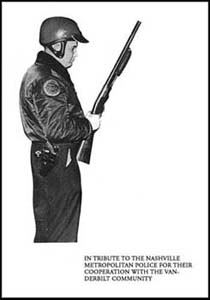
The dilemma that is presented here is perhaps the dilemma that faces
every Southern white person who becomes deeply committed to the
integrationist movement. How do you relate to the white southern
moderate or liberal and at the same time relate to a group of people
who are as militant and as activist as students in the Student Nonviolent
Coordinating Committee?
—Bob Zellner
For too long, we have attempted to bring white people into the
freedom movement. I think we must reverse this process and take
the movement into the white communities. We must help white people
see that the Negro has gained strength by casting off fear and
that the white man is still the slave to fear. . . . all [whites] are
enslaved in the South, denied their free speech and their opportunity
for a good life.
—Sam Shirah
When you decided to come this distance to this conference, why did
you do it? Do you know what is needed on your campus, in your
community, in the state, and in the South and the nation? And finally
and most importantly, are you ready to make sacrifices for significant
change? Are you willing to become totally involved? . . . Do we have
the courage and the vision to make a revolution?
—Ed Hamlett
It wasn’t so much about creating an organization, it was about how
you involve more whites in the civil rights movement and pull them
to the other side so that they’re not against what’s going on. And if
they’re a little bit hesitant, then the organization could provide a way
for them to move into more activism and be a support group.
—Sue Thrasher
In the South, the transition from civil rights to the war and campus
issues was continuous and direct. Students who participated in the
civil rights movement were radicalized by their experiences in
it. . . . No one started out . . . on radical footing. It was on-the-job
training for all of us.
—Marshall B. Jones
The last five years of southern history has stripped the “southern way
of life” of its magnolia blossoms and southern belles. . . . We are living
in a region where there is an obvious need for broad secular
changes if the “New South” is to be a well balanced and just society.
—1965 SSOC Conference Report
I believe they, more than anyone else in the South, started and made
possible some genuine anti-Vietnam protest in the region. Before
SSOC there was nothing. After SSOC some things began to happen.
Now I know that there were a number of other historical developments
coming along at the time. But I would still insist that this little
group sparked the thing.
—Will D. Campbell
What do you do when the radical black activists, the ones who share
your . . . ideology and politics, are saying “we need a black organization?”
I mean, [do] you say, “yeah, that’s fine, we totally support
your rights to do that but loan us a few of your best activists to be
part of our white organization?” It’s a weird position to be in.
—Tom Gardner
I had a theory that everybody was organizable, every single
person. . . . Everybody had something they thought was wrong with
the system. Everybody. They had noticed some injustice somewhere.
And I thought you could find it if you talked to them long enough.
—Lyn Wells
What alternative to electoral politics is posed to white middle-class
students (and professors) who every year flock to the Stevensons,
Kennedys, and McCarthys? . . . The alternative is becoming ever
more clear; build a movement based on the personal exploitation of
middle-class students (and professors) and from that base attempt to
relate to the needs of the black movement, the Chicano movement
and the labor movement.
—Gene Guerrero